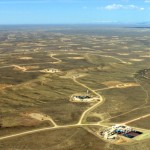
By Bobby McEnaney
Now that House Republicans have moved beyond closing national parks, stalling environmental safeguards and canceling research in places like Antarctica with the government shutdown, they’re scheduled to pass three wildly misguided energy bills.
These bills, H.R. 1900, H.R. 1965 and H.R. 2728, would give industry complete control over federal lands, and shut down the public’s voice. Worse yet, they would actually force development on precious lands in such places as the Arctic National Wildlife Refuge in Alaska. Already the White House has threatened to veto two of the bills.

Even stalwart supporters of fossil fuel development should be taken aback by the overreaching nature of these bills. We strongly urge Americans to call on their elected representatives to vote no on this terrible trio, for the good of our country’s natural resources and to protect the right of public engagement. Let’s take a closer look at why.
H.R. 1965
The first bill, H.R. 1965, is sponsored by Rep. Lamborn (R-CO). This would direct that federal lands be managed for the primary purpose of energy development, rather than for stewardship balancing multiple uses including recreation. Astonishingly, it also would curb and then penalize the public for raising concerns about oil and gas projects on public lands that may affect them.
One provision pushes the Interior Department to open up the Arctic National Wildlife Refuge to oil and gas exploration if the State of Alaska supplies matching funds to carry out an exploration program.
Another would lead to rubber-stamping drilling permits before fully considering safety and environmental concerns. It sets arbitrary deadlines for the federal Bureau of Land Management to approve drilling permits and automatically approves them after 60 days.
Citizens who feel they may be adversely affected by oil and gas lease sales or permitting decisions would have to pay an arbitrary $5,000 fee just to file an appeal. This is a gross abuse of power, closing the courthouse door particularly on voices of minorities and other local community members trying to improve responsible management of public lands.
Also, in several ways, the bill undermines responsible management of the National Petroleum Reserve in Alaska. It would toss out an existing National Petroleum Reserve-Alaska Integrated Activity Plan, which was approved after 400,000 Americans, including Alaskans, sportsmen and scientists weighed in, and instead orders the use of an alternative allowing new drilling in the Reserve’s five designated “Special Areas,” which are valued for wildlife habitat and native subsistence.
Finally, H.R. 1965 would jump-start development of a dirty fuel—oil shale—on public lands by requiring the use of a discredited Bush Administration oil shale leasing program. And it would abolish the Bureau of Land Management’s new oil and gas policy that aims to balance development with protection of public lands.
H.R. 2728
The second bill, H.R. 2728, is sponsored by Rep. Flores (R-TX). It would overturn decades of precedent to undermine protection of federal lands with the goal of promoting fracking for oil and natural gas.
It basically puts states in charge of fracking on federal lands within that state’s borders. And it tells the Department of Interior, charged with managing federal lands wisely for future generations, to butt out. The bill prevents Interior from enforcing any federal standards on hydraulic fracturing if a state has any rules or even vague guidance for fracking. The unstated purpose: give control to whichever level of government is least likely to protect the public, and it undermines the whole principle of governance for federal lands.
It also could lead to barring federal oversight of fracking-related activities on federal lands, including toxic waste management, clean water protection and other important regulatory responsibilities.
The bill needlessly interferes with an Environmental Protection Agency scientific study of the impacts of fracking on drinking water resources without providing the agency with the funds it would need.
H.R. 1900
The third bill up, H.R. 1900, is sponsored by Rep. Pompeo (R-KS). It would rush approval of natural gas pipelines with disregard for potential impacts on the public and on clean water and air.
The Federal Energy Regulatory Commission would have only one year to consider a completed permit application for a pipeline, despite the fact that such projects often are complicated, risky and take longer to evaluate. Other agencies would have only three months to sign off on associated permits required by the Clean Water Act and Clean Air Act.
If federal agencies didn’t meet the deadlines, a pipeline would automatically be approved. That would set up inevitable disasters down the road.
These bills don’t make sense. They are not safe or environmentally wise. They’re not the direction America should go to meet our energy needs in the twenty-first century.
Visit EcoWatch’s ENERGY page for more related news on this topic.


Leave a Reply
You must be logged in to post a comment.